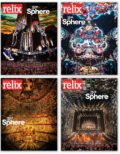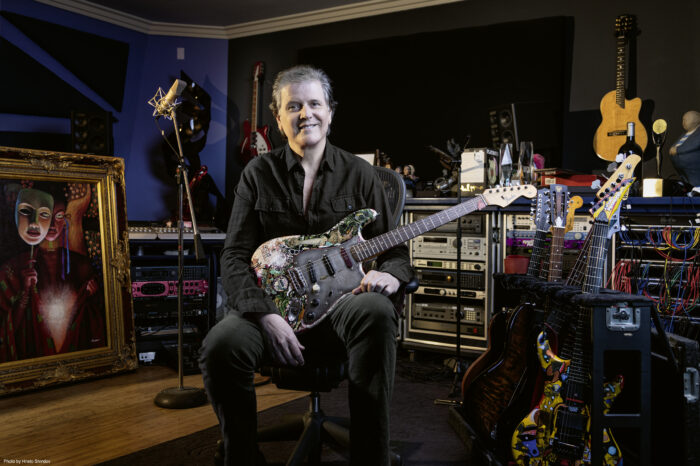JPG: Going back to the 2017 interview I did with you, at the time we were talking about your Hollywood scores and writing rock and roll material and you said, “That’s the most important element with the new songs…it’s more of an arrangement thing than the actual writing but it’s definitely part of it.” Still feel that way?
TR: Absolutely. It was that way throughout the album. You make a good point. Even on “Can’t Look Away” a lot of how I approach, even with some of the Yes stuff, I approach arrangements, not just with guitar but keyboards and even bass parts and vocal parts as an arrangement as opposed to getting a block thing or some kind of metal fifths guitar part. I always like to try to make the parts a little bit more arranged, as you would an orchestra.
JPG: It’s been 34 years since Can’t Look Away. Between the time that you left Yes and concentrated on film scores were you and are you always jotting down ideas or recording ideas and thinking, “This could be for my next rock album or this could be used for a film score” and you go back to it later because you have a catalog of things to use?
TR: It’s funny you say that. My wife always says to me, “You’re like an alcoholic, but instead of bottles in the drawers, it’s just pieces of scraps of paper with music on them.” I’ve said this before, but we went for dinner years ago, and I can’t remember which film I was on, but she looked at me and she was talking to me, kind of in depth, and I was listening, and then suddenly she said to me, “You’re not listening to me, are you?” And I said, “Sorry?” And she said, “Oh God” She puts some paper in front of me and gave me a pencil. She said, “I know you’re thinking of something,” and she was right. I couldn’t hide from it.
JPG: That’s nice that she’s patient about it. Lou Reed talked about songwriting as a radio station running through his head.
TR: Yeah, it’s kind of at all times. For example, there’s a song on the Rio album called “State of Play,” and the whole idea of the song came from an ambulance passing me at heavy speed on the road, and the doppler effect going meeeeeeaaaaaaahhhh…
The whole idea of that song came from just the ambulance passing me because I heard that, and it just clicked in. So, there’s music everywhere. It’s like 24/7 intoxication.
JPG: That’s interesting you say that because it always amazes me when I’m in a city like New York or Chicago and there are people walking around with their earbuds on, and I’m thinking that there are so many interesting sounds coming in all directions that they’re missing.
TR: Oh, I so agree with you and, also, you’re closed off from everything. But you’re so right, the sounds of not having your earbuds in is so much more interesting.
JPG: One other thing about that—the ideas that you accumulate over the years, is that why you end up doing the majority of instrumentation because you’re recording bit and pieces every so often and collect them?
TR: Yeah. When I’m thinking of a piece, I often think of the idea and then, “That’ll be a good bass part.” and then if I streamline the guitars I’m thinking about and I can stick them on the right and take everything from 100 hertz down out, it’ll give us room for doing such and such over there. It’s always this building thing, like a jigsaw puzzle, which is in my head before I even touch the paper or the screen.
JPG: I read that you attributed the COVID pause as helping you record the new album. Was that correct?
TR: That was very correct. In fact one of the drum tracks that Vinnie Colaiuta did on “Push,” and he’s just an incredible player. He worked on my previous album, which was an instrumental album (“Jacaranda”). He came to my house to my studio and played at my studio.
This time it was “Wow! I can’t see anybody.” I literally did a film during that time and usually with a film there’s editors, directors, producers coming to the house at all times…my music editor, my assistant…but this time there was no one. It was kind of eerie doing a film completely alone and just doing zoom calls and handling stuff in over the internet.
On this album, just sending the stuff out to Vinnie was weird, but he’s so good. He sent it back. “I’ve given you three versions, three takes of the song. Let me know if it’s cool. And if not, I’ll do it again.” And I emailed him and said, “You’ve given me a problem. They’re all perfect. I’m not sure which one to use.” (laughs)
JPG: The way that the music industry works there’s a gap of time between when the album’s finished and when it’s released. So, have you been working on either new solo material or another film score? And if film, did the writers’ strike and actors’ strike affect what you do?
TR: [The strikes] actually didn’t make any difference because a lot of the stuff is organized beforehand.
Most importantly, as I said in the beginning, this album woke me up and I was invigorated. When I finished the album, I’d done it all alone in the studio, other than obviously, the great drummers who are on it, and I said to the guy who mastered it, whose ears I really trust, I called him and said, “I’m not sure about the right cymbal on the chorus of “Toxic.” I think we have got to raise it. It’s not quite right.” And he just said to me in the nicest possible way, “Let it go. It’s done. It’s fine. Let it go.” And I realized at that point that I’ve got so much more stuff in my pocket that I want to get out. So, I want to do another album before I think about any movie stuff.
JPG: It’s so common that when someone releases an album, they play some live dates. Are there any plans to play any shows to support this?
TR: I always want to go on the road straight afterwards and for the most part, that’s what I’ve done. We’re all hoping that that’ll happen on this one but it’s such early days. I’m almost playing catch up now [including] doing what we’re doing, working that and I’m going to Cleveland at the end of the week.
It’s funny because Larry Magid, a friend of mine and the guy who was the promoter on ARW, he has suggested that a number of times and he was ready to do it, but I’ve been doing the album. To do a tour, essentially doing my stuff from Yes and from Can’t Look Away and various solo stuff, but also doing orchestral stuff, having an orchestra do it, and he was totally into that. So now, he’s really gung ho. We’ll see what happens. I always love to play.
JPG: Well, speaking of Cleveland, the Cleveland Orchestra’s world famous…
TR: Oh, absolutely. They’re fantastic. The way that’s usually done is you have key people, like you might have your first chair violin, maybe one French horn player, maybe one cello…you take two or three people on the road and then you just have a pickup orchestra with great bookers who know who the good people are.
If you do it like, I think it was ELP went on the road and took the orchestra on the road, and they lost an absolute fortune.
JPG: Yes, to tie it to Cleveland, that was where they dropped the orchestra because the story goes that they were going from floor-to-floor in their hotel and seeing all the musicians having parties and thinking, “We’re paying for all of that!”
TR: Oh my goodness.
JPG: So, the next date was Cleveland, technically the Richfield Coliseum, and they returned to the trio format. I saw them on that.
TR: Wow.
JPG: It was my first show. I talked my dad into taking me to see them because I was a young kid at the time. It was the three onstage and I was fine with that. They were amazing.
TR: You know, it’s so sad, man. I don’t know how long before — but it couldn’t have been more than three weeks or maybe a little more — Keith [Emerson] and I and our wives went for dinner together. Had a ball of a time. He’s a brandy drinker, and we’ve been having some brandy and having a great time. Then, weeks later, I find he’s gone. Oh my God! I couldn’t believe it. [Emerson committed suicide in 2016. At that time he was depressed and anxious due to nerve issues and pain in his right hand.]
JPG: I know. So sad and such a crazy interesting reason of why he did what he did.
TR: Almost twice as sad in a way.
JPG: Finally, you’ve kind of answered it but if you have anything specific, here’s your chance. What’s next?
TR: Immediately after the dust settles, and I’m back in the studio, the next thing I do is another album.
JPG: I imagine you’ve been recording bits here and there when you have the chance.
TR: Yeah, I have and, as my wife says, “The untidy pieces of paper all around the house don’t stop.”



No Comments comments associated with this post